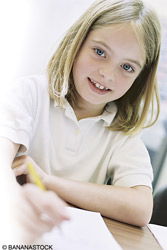Teaching gifted and talented children
Add to My Folder
Discover how you can spot a potentially exceptional child and foster a learning environment that provides support and challenge…

Today’s gifted and talented children are tomorrow’s inventors, scientific leaders, prima ballerinas and Olympic medallists. Yet fulfilment of their potential depends on the opportunities they are offered. The responsibility of adults is to foster that potential and encourage its development. Teachers have a unique opportunity: they are able to compare individual children with the rest of their age group, and identify the gifted and talented.
Gifted children
Complex tasks are welcomed by gifted children and problem-solving is enjoyed. There is a desire to move beyond the obvious and be inventive. The child is undaunted by advanced resources.
It is easy to confuse gifted with knowledgeable. Young children have had few years to acquire knowledge. They may show mental speed when coping with new concepts, but they have first to encounter them: gifted children need attention as much as a child with special needs.
Talented children
Talented children are likely to exhibit unusual focus and absorption in specific areas of the curriculum. Their involvement, skill, practice and insight exceed their peers’. With these children, it is essential to look for ways to develop their talents. A local football club may be willing to offer help with ball skills; a ballet company may provide dance tuition; a local artist can improve technique and so on. Parents also need support and information. Do they know that their child’s singing voice is exceptional? What is the next step?
What do I need to know?
How many gifted and talented children are there?
The top 5% of all children are gifted and talented. This does not mean that their gifts and talents are in every subject: a child gifted with exceptional mathematical thinking may perform poorly at sport, and a talented gymnast may struggle with literacy skills.
Who are gifted and talented children?
The term ‘gifted’ applies to children who show exceptional potential in academic subjects. The term ‘talented’ applies to children who show exceptional potential in subjects such as sport and expressive arts.
How can we identify these children?
There are no hard and fast rules. Gifted and talented children are as different from one another as any group. Identifi cation is certainly more difficult at KS1 than at later stages: the children still have a great deal to learn. Nevertheless, there are typical characteristics to be alert for.
They can typically:
- Think quickly.
- Reason well.
- Understand complex instructions.
- Grasp new concepts easily; remember and apply them.
- Become absorbed in tasks.
- Show invention and imagination.
- Ask searching questions.
- Make perceptive, original comments.
- Demonstrate persistence and perfectionism.
Already a member? Sign in below.
Published 4 June 2008
Reviews
You need to be signed in to place a review.